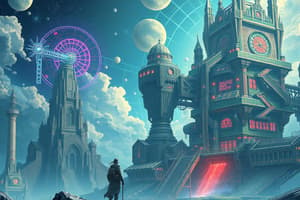Podcast
Questions and Answers
A System of Interest is defined as a System that is currently being developed.
A System of Interest is defined as a System that is currently being developed.
True (A)
An Enabling System is one that is solely isolated from the System of Interest.
An Enabling System is one that is solely isolated from the System of Interest.
False (B)
All Systems are defined by their individual characteristics and structures.
All Systems are defined by their individual characteristics and structures.
True (A)
System Elements cannot be broken down into lower-level System Elements.
System Elements cannot be broken down into lower-level System Elements.
System interactions among System Elements are insignificant to the overall system understanding.
System interactions among System Elements are insignificant to the overall system understanding.
The complexity of a System is determined by the number of System Elements it contains.
The complexity of a System is determined by the number of System Elements it contains.
System hierarchies are typically kept to a low number of levels for simplicity in initial discussions.
System hierarchies are typically kept to a low number of levels for simplicity in initial discussions.
All types of Systems share a common set of characteristics.
All types of Systems share a common set of characteristics.
Electronic System Elements in modern cars do not include controllers.
Electronic System Elements in modern cars do not include controllers.
Sensors in cars can measure attributes like temperature and pressure.
Sensors in cars can measure attributes like temperature and pressure.
Modern cars rely solely on hardware components without any software integration.
Modern cars rely solely on hardware components without any software integration.
Actuators in an electronic system can include devices like motors and levers.
Actuators in an electronic system can include devices like motors and levers.
The communication protocols in cars are unnecessary for the operation of the system elements.
The communication protocols in cars are unnecessary for the operation of the system elements.
The basic need for a car has changed significantly over the last 50 years.
The basic need for a car has changed significantly over the last 50 years.
The complexity of System Elements in cars has decreased over time.
The complexity of System Elements in cars has decreased over time.
Display elements in modern cars include dashboard lights and audio alerts.
Display elements in modern cars include dashboard lights and audio alerts.
The four System Elements that make up a car are the Body, Chassis, Interior, and Transmission.
The four System Elements that make up a car are the Body, Chassis, Interior, and Transmission.
A majority of the System Elements in a 50-year-old car are electrical in nature.
A majority of the System Elements in a 50-year-old car are electrical in nature.
Modern cars incorporate electronic and software-based System Elements that were absent in older models.
Modern cars incorporate electronic and software-based System Elements that were absent in older models.
The Interface between System Elements in a 50-year-old car is primarily electrical.
The Interface between System Elements in a 50-year-old car is primarily electrical.
The Drive Train includes elements such as seats and dashboard.
The Drive Train includes elements such as seats and dashboard.
Point-to-point wiring is a complex process required for electrical connections in older cars.
Point-to-point wiring is a complex process required for electrical connections in older cars.
The System Elements in a modern car mainly consist of mechanical components.
The System Elements in a modern car mainly consist of mechanical components.
Brakes, wheels, and suspension are considered lower-level System Elements of the Chassis.
Brakes, wheels, and suspension are considered lower-level System Elements of the Chassis.
Flashcards are hidden until you start studying
Study Notes
Characteristics of a System
- Systems contain interacting elements, forming a natural structure.
- Distinction between two types of systems:
- System of Interest: Under development.
- Enabling System: Interacts with or has interest in the System of Interest.
- System Elements can be hierarchically structured, allowing for multiple levels of breakdown.
- Interaction between System Elements is crucial for understanding and applying Systems Engineering.
System Elements in Cars
- Four primary System Elements in a car:
- Body: Comprises wings, doors, mirrors.
- Chassis: Includes brakes, wheels, suspension.
- Interior: Contains seats, dashboard, controls.
- Drive Train: Comprises the motor and gearing.
- Older cars are primarily mechanical, with limited electrical components (lights, indicators, fan, and wipers).
- Mechanical interfaces dominate, resulting in simpler integration processes.
Evolution to Modern Cars
- Modern cars incorporate electronic and software-based System Elements, vastly differing from older mechanical systems.
- Types of Electronic System Elements:
- Controllers: Manage various functions like lighting and indicators.
- Sensors: Monitor parameters such as temperature and pressure.
- Actuators: Facilitate movement via levers and small motors.
- Display Elements: Dashboard lights and alerts.
- Software in modern cars is distributed across multiple nodes, requiring complex communication systems (e.g., Controller Area Networks).
Complexity of Modern Systems
- Interfaces in modern cars have become more intricate, involving data transfer and communication protocols.
- Integration now requires understanding subtle changes in voltage and current, along with complex wiring setups.
- Overall complexity has increased, not just in quantity of System Elements but also in their operational nature.
Persistence of Basic Need
- The fundamental need for transportation remains unchanged: moving people from point A to B.
- Retrospective shift in automotive design focus has evolved from speed alone to encompass other critical factors.
Studying That Suits You
Use AI to generate personalized quizzes and flashcards to suit your learning preferences.




